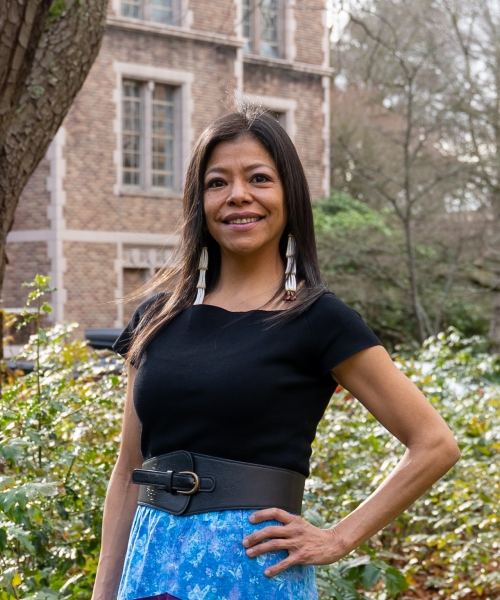
Additional Appointments
Affiliate Faculty, Banks Center for Educational Justice
Research Interests
Emma Elliott
Dr. Elliott (Cowichan Tribes) is an associate professor in the Department of Learning Sciences and Human Development in the College of Education at the University of Washington. She holds a Ph.D. in Educational Psychology and a Master of Social Work in Children, Youth, and Families. Her research sits at the interdisciplinary intersections of culture, learning, and human development; land-based and Indigenous methodologies; and trauma, prevention, and recovery among Indigenous children and youth. Grounded in Indigenous ethical frameworks and relational, land-based knowledges, her work develops strengths-based, process-centered approaches that illuminate Indigenous pathways toward collective livelihood and wellbeing.
Dr. Elliott’s scholarship rigorously engages youth, families, and communities in the design of integrated educational and behavioral health interventions that address social issues through relational, community-led practice. Her current projects include collaborative work with Cowichan Tribes to strengthen the physical, mental, intellectual, and cultural health of the community. Building on this foundation, she is also advancing a line of research that examines the legal dimensions of Indigenous wellbeing, particularly the relationship between federal Indian law, jurisdictional harm, and Indigenous children’s mental health. This emerging work brings together land-based education, relational sovereignty, and legal analysis to understand how structural conditions shape the possibilities for healing, continuity, and thriving in Indigenous communities.
San Pedro, T. & Elliott, E. (forthcoming). Beyond Qualitative Interviews: Toward Synergistic Conversations as Relational and Nation Building (Edited book chapter).
San Pedro, T. & Elliott, E. (forthcoming). Centering Relationships in Research: Storying as Methodology. In Winn, M. T., & Lawrence, W. T. (Editor in Chief) and Montano, E. & Martinez, D. (Volume Editors), The Bloomsbury Encyclopedia of Social Justice in Education. London, UK: Bloomsbury Publishing PLS.
Wexler, L, White, L., O’Keefe, V., Rasmus, S., Haro, E., Cwik, M., Barlow, A., Goklish, N., Elliott, E., Pearson, C., and Allen, J. (forthcoming). Centering Community Strengths and Resisting Structural Racism to Prevent Youth Suicide: Learning from American Indian and Alaska Native Communities. Archives of Suicide Research.
Ullrich J., Demientieff L, & Elliott, E. (2022). Storying and re-storying: Co-creating Indigenous well-being through Relational Knowledge Exchange. American Review of Canadian Studies, 52 (3), 247-259.
Elliott-Groves, E. & Meixi (2022). Why and how communities learn by observing and pitching in: Indigenous axiologies and ethical commitments in LOPI (Cómo y porqué las comunidades Aprenden po rmedio de Observary Acomedirse axiologías indígenas y compromisos éticos en el modelo LOPI), Journal for the Study of Education and Development (Infancia y Aprendizaje), [Special Issue] Learning by Observing and Pitching In to Family and Community Endeavors. doi:10.1080/02103702.2022.2062916
Meixi, Moreno-Dulcey, F., Alcalá, L., Keyser Ohrt, U., & Elliott-Groves, E. (2022). When Learning is Life-giving: Re-designing Schools with Indigenous Systems of Relationality. American Educational Research Association Open (AERA), 8, doi.org/10.1177/23328584211062587
Jansen, K., Shaw, J., Comtois, K. A., Elliott-Groves, E., Slaney, T., Avey, J., & Nelson, L. & The CARE Phase 1 Study Team (2021). Culturally Adapting Caring Contacts for Suicide Prevention in Four Alaska Native and American Indian communities. Archives of Suicide Research. doi:10.1080/13811118.2021.1967820
McCoy, M., Elliott-Groves, E., Sabzalian, L., & Bang, M. (2020). Restoring Indigenous systems of relationality. [Invited Testimony]. Center for Humans and Nature. Libertyville, Illinois. https://www.humansandnature.org/restoring-indigenous-systems-of-relationality
Elliott-Groves, E., Hardison-Stevens, D., & Ullrich, J. (2020). Indigenous Relationality is the Heartbeat of Indigenous Existence during COVID-19. [Special issue]. Journal of Indigenous Social Development, Indigenous Communities and COVID-19: Impact and Implications, 9 (3), 158-169.
Henne–Ochoa, R., Elliott–Groves, E., Meek, B. A., & Rogoff, B. (2020). Pathways Forward for Indigenous Language Reclamation: Engaging Indigenous Epistemology and Learning by Observing and Pitching in to Family and Community Endeavors. The Modern Language Journal, 104 (2), 481-493.
Elliott-Groves, E. (2019). A Culturally Grounded Biopsychosocial Assessment Utilizing Indigenous Ways of Knowing with the Cowichan Tribes. [Special issue]. Journal of Ethnic & Cultural Diversity in Social Work, Advances in Social Work Practice with Multicultural Communities, 17 (4), 115-133.
*Elliott-Groves, E. & Fryberg, S. (2018). “A future denied” for 21st century Indigenous youth: Reclaiming the future. [Handbook Chapter]. Handbook of Indigenous Education. (Eds. McKinley, E. & Smith, L.T.). Springer, Singapore. https://doi.org/10.1007/978-981-10-1839-8_50-1
Elliott-Groves, E. (2018). Insights from Cowichan: A Hybrid Approach to Understanding Suicide in One First Nations’ Collective. Suicide and Life-Threatening Behavior, 48 (3), 328-339. doi.org/10.1111/sltb.12364
